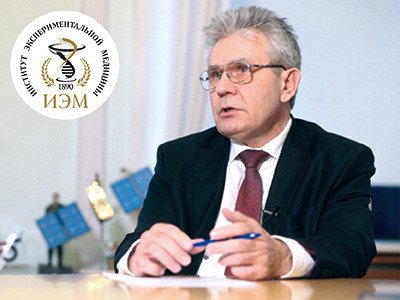Researchers at the Institute of Experimental Medicine (IEM) in St. Petersburg are creating the world’s first edible vaccine against coronavirus. President of the Russian Academy of Sciences Alexander Sergeev commented on the unique development of his colleagues from St. Petersburg.
“Several dozen vaccines against COVID-19 are now registered in the world, and hundreds more are in development. A question therefore arises: can something else be devised in response to the pandemic? In fact, there still are possibilities, and that’s what our scientists from the Institute of Experimental Medicine in St. Petersburg have proposed and done ─ this is an absolutely unique development that I would really like to talk about.
We already know how coronavirus enters the human body. Also, surely everyone already knows that we have humoral immunity and cell-mediated immunity. Much is also known about the different platforms on which coronavirus vaccines are based, both vaccine candidates and those in active use. There is some general concept what such vaccines are made from: it is either a weakened virus or a virus that is inactivated, or it’s an adenovirus. Turning to other platforms which have now become popular, they comprise artificial vaccines based on the creation of nano-objects that convey genetic information about some kind of antigen into the cell. It would seem that we already have a full spectrum and we cannot offer anything more! But that’s hardly so. Our colleagues from St. Petersburg proposed a unique vaccine based not on viruses or genetic fragments that are isolated from the virus ─ but on bacterial delivery. This is a totally new approach: with genetic engineering methods, the gene of the S-protein from that very coronavirus is grafted into milk-fermenting bacteria; and, when the bacterium lives, S-protein is produced on its surface. Thus, bacteria become much like the virus that causes COVID-19. And that, in turn, provokes the necessary immune response from the body.
What is most interesting about this technology is that bacteria are produced in a completely different manner, unlike the vaccines mentioned above. In addition, bacteria, unlike viruses, have a completely different route of entering the body. As they carry S-protein elements and cause an immune response, these bacteria can be delivered through the gastrointestinal tract. This is a totally unorthodox delivery method. We know that our body receives quite a lot of bacteria this way, and our gastrointestinal system is perfectly adapted to elicit an immune response.
What else, besides the bacterial delivery method, is interesting in this technology? Bacteria, unlike the vaccine platforms you and I talked about, are much easier to produce. They can be cultured at any dairy plant. This production is safe and fast. If preclinical and clinical trials indeed confirm that such vaccination is effective, it will open truly immense possibilities for the production and distribution of this vaccine. And we already see that it will be much cheaper than the rest of vaccines developed on other platforms. This supports additional interest in such an edible dairy vaccine.
Our dear colleagues from Institute of Experimental Medicine in St. Petersburg, as well as our colleagues from N. F. Gamaleya Research Institute of Epidemiology and Microbiology, the M.P. Chumakov Institute of Poliomyelitis and Viral Encephalitis, as well as Novosibirsk-based Vector, would not be able to attain this success were it not for careful preparation. A few years ago, the Institute of Experimental Medicine patented a bacterial vaccine against pneumococcus, a flu vaccine, and other developments. Based on such academic achievements and building upon this platform, a vaccine against coronavirus was patented and proposed. I believe this is case of a brilliant scientific result achieved in Russia. Nowhere in the world can one see such innovations. Moreover, this result has already been brought to a stage where it may be interesting to investors. We hope that after clinical trials, this new vaccine will see the light of day and will be in demand around the world.”
Photo: Nikolay Malakhin / Scientific Russia






















